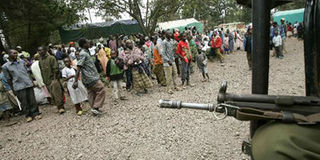Rape victims awaiting justice

Displaced people camp at a police station in Solai, near Nakuru. More than two years after the post-election violence, women who were raped are still waiting for their attackers to be brought to book. Whereas some of the rape victims know those who assaulted them, others do not. Photo/FILE
More than two years after the post-election chaos, many women who suffered sexual violence and abuse are still waiting for justice.
And as the world celebrates the annual International Women’s Day, the survivors are still trying to reconstruct their lives.
Physical and emotional wounds remain. Children were born out of rape, some women were infected with HIV and other sexually transmitted infections, and others lost their husbands through divorce and killings.
As always happens in conflict, some women suffered at the hands of people who were well known to them, even neighbours. Yet others cannot identify their attackers because the incidents happened at night.
Those who could identify their attackers are still afraid and do not want to talk about them, some fearing to be abandoned by their husbands if they did so.
Nairobi Women’s Hospital alone attended to more than 2,500 sexual assault cases associated with post-election violence, out of which about 600 were rape cases.
Many have told their stories but shied away from having their identity disclosed.
One such survivor recalls how her attackers killed her husband then gang-raped her. Another recalls how her stomach was slit open after she had been raped, then left for dead.
In cases of violence, such as was experienced in Kenya, gangs take advantage of women’s vulnerability.
A new report produced by the Agency for Cooperation and Research in Development (Acord) from court records in Kisumu and Nakuru, shows that survivors of sexual violence made attempts to have the perpetrators prosecuted. However, in a report titled “A case for Protection and Restitution for Survivors: Sexual and Gender Based Violence in Kenya”, Acord says that many women do not report rape.
Many of those who were raped during the post-election violence made no immediate reports to authorities or even to hospitals and they only went there for treatment of ailments related to the violence they had suffered.
The Acord publication brings out the voices of the many invisible survivors who suffered during Kenya’s political crisis.
“They are suffering because nobody cares, there is no support absolutely,” law and human rights advocate Maina Kiai said at the launch of the Acord report in Nairobi on Friday.
Mr Kiai said he spoke to women who were gang-raped in Kisumu. They had formed a support group of 50 and according to the human rights activist, at least 22 have died.
Abandoned
“They were completely abandoned after they were asked to testify to the Waki Commission and one counselling session held for them,” he said.
Mr Kiai warned that the same gangs that raped during the chaos would do so again if there was another crisis, hence the need to weed them out and make them face justice.
Justice, National Cohesion and Constitutional Affairs minister Mutula Kilonzo agreed with Mr Kiai that there must be adequate steps to prevent similar violations in future.
“This must begin by recognising what happened to them as documented by the new publication and any others in the past,” he said while launching the Acord report.
Mr Kilonzo noted that while many continue to refer to it as the post-election violence, it was clear from the accounts of survivors that their experiences were crimes against humanity and not merely violence.




